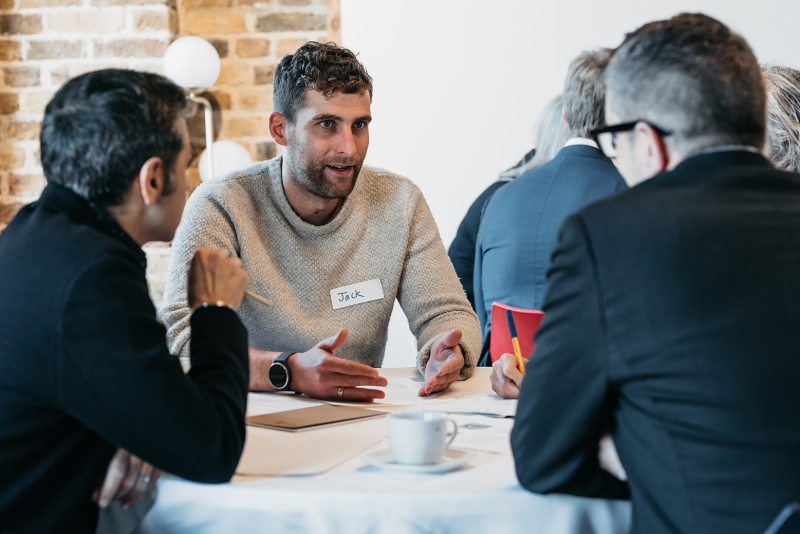‘What’s the cost of carbon?’ – London roundtable discussion
Early November, Civic Engineer’s London studio held its second round table discussion of 2022; this time to provoke a discussion on the Cost of Carbon (however its participants measured it). Chaired by Trilogy Real Estate’s May Molteno, a qualified expert in group facilitation and the developer’s Head of Sustainability and Stakeholder Engagement, we were guided to experiment in the talking format. Creative listening methods call for creative idea making, after all.
Taking part in the discussion were:
- Andrew Ruck, Civic Engineers (Host)
- Annabel Precious, Civic Engineers (Host)
- Arvinder Birdi, Gardiner & Theobald
- Ashley Broderick, Socius
- Christopher Martin, Urban Movement
- Dominic Lion, Gallagher
- Dominique Staindl, Communications consultant
- Gareth Atkinson, Civic Engineers (Host)
- Gill Breen, Currie & Brown
- Harbinder Singh Birdi, Birdi & Partners
- Jack Wardale, Undivided Ventures, EcoBuild Advisory
- May Molteno, Trilogy (Chair)
- Mitch Cooke, Greengage
- Nick Blackmore, Inner Circle Consulting
- Rachel Pickford, Sarah Wigglesworth
- Rob Westcott, Civic Engineers (Host)
- Robbie Jardine, Alinea Consulting
- Roslyn Stanwick, Civic Engineers (Host)
- Sam Martin, Exterior Architecture
- Seth Cooper, Opera PM
Borrowing from the Quakers, we followed the ‘Fishbowl’ format, which is a consensus decision-making tool; with 20 of us working in small working groups for a short period of time, we then each nominate representatives to give feedback to the wider group. What’s extraordinary about this format, and rarely found in common western discourse (particularly where listening is most critical such as parliament or in public panels), is how everyone can be involved. By politely tapping a shoulder and opting-in to the discussion, you can have your say; but more importantly, keeping silent when not acting as a representative allows for far deeper listening than we are often afforded and are certainly used to.
Here’s the scenario we were presented with: It’s the year 2062. We’ve reversed the climate catastrophe. What policies or key moves would we have needed to make to get there. Everyone in the room is called on to be a visionary warrior; to take their experience as professionals in the built environment and share what moves we need to make as a society to alter our trajectory for a healthier planet.
After the hour-long exercise, the groups came together to share, and to listen. Our first discovery was this: we need to come together to agree on our definitions of what ‘Net Zero’ or carbon cost is. Ideas were shared about taxing carbon and educating clients, using material passports and by acting locally in a way we don’t already. About making our buildings work harder; using them across the day (and night, perhaps!) for different purposes.
Include embodied carbon into the discussion on building upgrades. Better the existing draft paper on Part Z, which aims to limit embodied carbon in buildings being built. When coupled with Part L, which encourages the striping back of buildings to their frame then adding new materials, there’s no balancing point.
We suggested banning fossil fuels to produce our supplies; and banned demolishing buildings by 2025. Then conceded that a strong case would need to be made for demolishing buildings; but they still need to be dismantled, and the materials would need to be reused. That we could swap our use of common plastics for plant-based and biodegradable alternatives.
Then we urged more interaction between the public and politicians, to facilitate the sense of urgency for the next generation. To benchmark an understanding of how to measure and implement needs, we grasped at giving people power to pick better ways of working, then commit to it through policy.
Broadening the discussion, fundamental changes need to happen in global systems; and we will need to pay for fossil fuels to be kept in the ground. Review how financial institutions make profits. And speed everything up tenfold. But how do we achieve all of this?
We start by taking stock of what this conversation meant. Willing to experiment together in the format, and work together on a common problem we came up with over 10 unique solutions. The energy in the room was infectious; and each participant shared a word or sentence to describe how they felt after the exercise. May would like to lead a symposium of conversations bringing industry thinkers together regularly to provoke fresh thinking and affirmative action.
Please be in touch with roslyn@civicengineers.com to be involved in future discussions.
Here’s a summary of key takeaways:
- Change the way you communicate to alter the way you think
- Listen more, and quietly.
Ideas:
- Create a unified agreement of what carbon is and legislation on how you measure it
- Facilitate an international call to action for knowledge sharing
- Employ everlasting buildings thinking and government-backed incentive programmes
- Redefine what growth is; ROI needs to be ESG focused
- Shift to ‘Absolute Zero’ concept
- Implement a whole life carbon tax
- No fossil fuels in building material manufacturing
- Ban on plastics and single use materials and investment on materials
- Don’t demolish unless you can make a strong case for it
- Make existing buildings work harder and times in which they’re used
- No operational carbon and live reporting of energy use (smart meters on every property and live monitoring platform)
- Lego building policy – design to take parts of a building apart and/or have a strong reason for not (ie. building lasts 200+ years)
